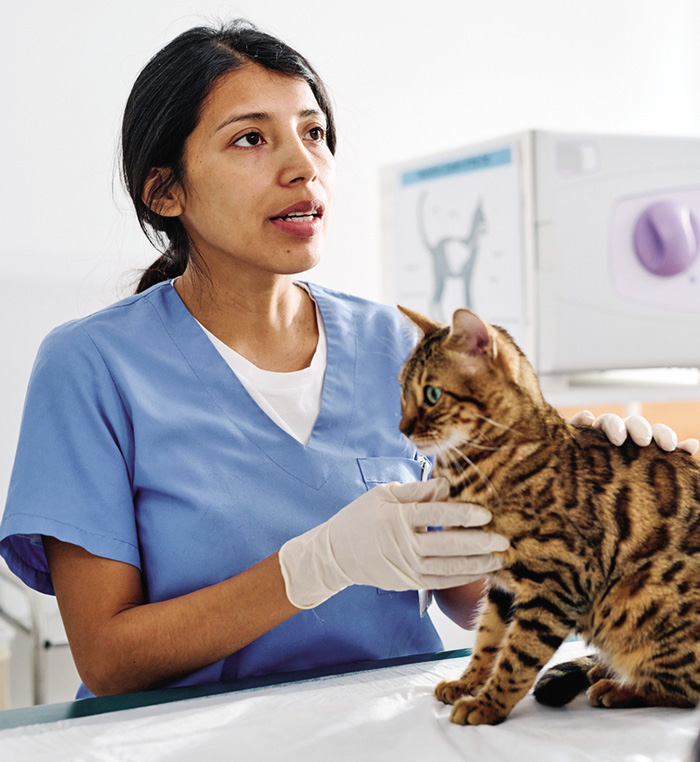A cat with stomach cancer usually does not eat well, has weight loss with vomiting and diarrhea, and is usually lethargic. These symptoms are, however, nonspecific, as they can be caused by other problems, including liver disease, kidney failure, and inflammatory bowel disease. Regardless of their cause, cats with these clinical signs should be seen by a veterinarian promptly.
“The most common stomach cancer we see in cats is lymphoma. Other types of stomach tumors are rare and include leiomyosarcoma, adenocarcinoma, mast cell tumors, plasmacytomas, carcinoids, and benign polyps. To differentiate the type of stomach tumor, an ultrasound-guided fine-needle aspirate and cytology or endoscopic or surgical biopsy with histopathology must be performed,” says Skylar R. Sylvester, DVM, assistant clinical professor of oncology in the department of clinical sciences at Cornell University’s College of Veterinary Medicine.
Diagnosis
Bloodwork and a thorough physical exam are important initial steps in finding the cause of your cat’s illness. Your veterinarian may be able to palpate a mass in the abdomen or a thickened stomach wall. Radiographs and ultrasound also may show abnormal findings. For a diagnosis, a biopsy via endoscopy or surgery is necessary. Isolated masses are more likely to be adenocarcinomas, while large areas of thickened tissues tend to be lymphomas.
Prognosis and Treatment
Adenocarcinomas are often aggressive and have a guarded prognosis. Most cats diagnosed with this cancer are over 10 years old. Siamese cats have a genetic predisposition.
Leiomyosarcoma is an aggressive stomach and intestinal cancer that originates in the muscles of the gastrointestinal tract. This also has a poor prognosis due to its tendency to metastasize throughout the abdomen and/or to the lungs.
Cats have two basic types of gastrointestinal lymphoma, neither of which are associated with feline leukemia virus (FELV) infections. Small cell lymphoma tends to be a slowly progressive cancer and often responds to chemotherapy that can be given at home. About 90% of cats with this form respond to treatment with prednisolone, which is a steroid, and chlorambucil, which is an oral chemotherapy drug. Many cats tolerate this treatment quite well. Survival times are up to four years.
Large cell lymphoma is more likely to occur in the intestines and is a nasty cancer. Surgery followed by adjuvant systemic chemotherapy may give your cat some quality time, but the prognosis is not good.
Chemotherapy
“Chemotherapy is the most effective treatment for lymphoma. There are two types of lymphoma seen in the gastrointestinal tract of cats, small-cell low-grade lymphoma and large-cell high-grade lymphoma,” says Dr. Sylvestser. “They are treated with different types of chemotherapy and have different prognoses.
“Cytology or biopsy of the cancer is needed to differentiate between the two types. The treatment for small lymphoma is oral chemotherapy given at home, and cats can live one to two years or more with this treatment. Large-cell gastric lymphoma is a much more aggressive cancer, and cats are treated with front-line multi-agent injectable and oral chemotherapy, with survival often less than six months with treatment. However, there are some cats with large-cell lymphoma that achieve a complete remission with chemotherapy and can survive longer,” says Dr. Sylvester.
Deciding on a treatment protocol will need to be a decision individualized to your cat and her exact cancer. If she can’t be pilled without major stress to you and her, the options are limited. If she has large cell lymphoma but is massively stressed by the trips to the veterinary clinic for treatment, you may choose palliative care.
Prevention
Vaccinating against FELV is wise. Keeping your cats indoors to limit exposure and testing any cats or kittens that are added to your family makes sense.
The association between Helicobacter infections and gastrointestinal problems is currently being considered in humans and dogs. A study from the Massachusetts Institute of Technology found a positive association between Helicobacter infections and cats with gastric lymphoma. While the bacteria may also be found in some healthy cats, certain species may contribute to the development of this cancer, and more research needs to be done to determine whether this is the case.
Bottom Line
If your cat shows any of the signs mentioned, such as vomiting (other than obvious hairballs), diarrhea, especially if the stool is black from digested blood (melena), doesn’t want to eat, and acts lethargic, schedule a veterinary visit. These signs may be caused by a variety of health problems, all of which will benefit from early diagnosis and treatment.ν
Skylar Sylvester, DVM, is an assistant clinical professor in medical oncology at Cornell University’s College of Veterinary Medicine




